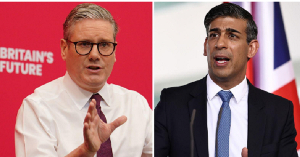As the United Kingdom recently concluded its parliamentary elections, it's essential to understand the differences and implications these elections might have in comparison to Ghana's upcoming elections in December. While both nations practice democratic principles, their systems of government are notably distinct.
The UK Parliamentary System
The UK's parliamentary system involves citizens voting for local candidates to represent them in Parliament. The political party with the majority of elected Members of Parliament (MPs) then selects the Prime Minister, who is usually the party leader.
For instance, in a hypothetical scenario, if Party A, led by Kwame, Party B, led by Ama, and Party C, led by Fati, contested an election, voters in areas like New Juaben would choose between candidates such as Akos (Party A), Amina (Party B), and Kodzo (Party C) for MP positions. The names of the party leaders, who aspire to be Prime Minister, would not appear on the ballot.
In the recent UK election, the major contenders were Rishi Sunak (Conservative Party), Keir Starmer (Labour Party), and Nigel Farage (Reform UK). Labour, led by Keir Starmer, secured the most seats, thus making Starmer the new Prime Minister.
Ghana’s Presidential System
In contrast, Ghana's presidential system will see voters electing both a president and MPs in the December elections. The ruling NPP, led by Mahamudu Bawumia, and the opposition NDC, led by John Mahama, are among the main contenders.
Unlike the UK, Ghanaian voters will see the faces of these presidential candidates on the ballot alongside their local MP candidates. Ghanaians will receive two separate ballot papers, one for the presidential candidates and another for parliamentary candidates.
Political Dynamics and Leadership Transitions
The UK Conservative Party has experienced significant leadership changes since coming to power in 2010, with leaders such as David Cameron, Theresa May, Boris Johnson, Liz Truss, and currently Rishi Sunak. Each transition brought different challenges, from Brexit to the COVID-19 pandemic.
These shifts highlight the party’s adaptability and the political volatility within the UK.
Ghana’s NPP government, under Nana Akufo-Addo and Mahamudu Bawumia, has faced various challenges, including economic difficulties, scandals, and the pandemic. Despite these issues, the government has implemented policies like free SHS and initiated infrastructure projects.
Commonalities and Strategic Voting
Both Rishi Sunak and Mahamudu Bawumia are known for their economic and financial expertise. As Ghanaians prepare to vote, it’s crucial to consider the country's current state and prioritize issues over party loyalty. This approach encourages informed and strategic voting, focusing on candidates’ capabilities and policies rather than mere party affiliation.
In conclusion, while the UK and Ghana have different electoral systems, the underlying democratic principles and the need for informed voter participation remain crucial. Understanding these distinctions helps in appreciating the broader political context and the importance of strategic electoral decisions.
Opinions of Saturday, 6 July 2024
Columnist: Martin Alohan



















